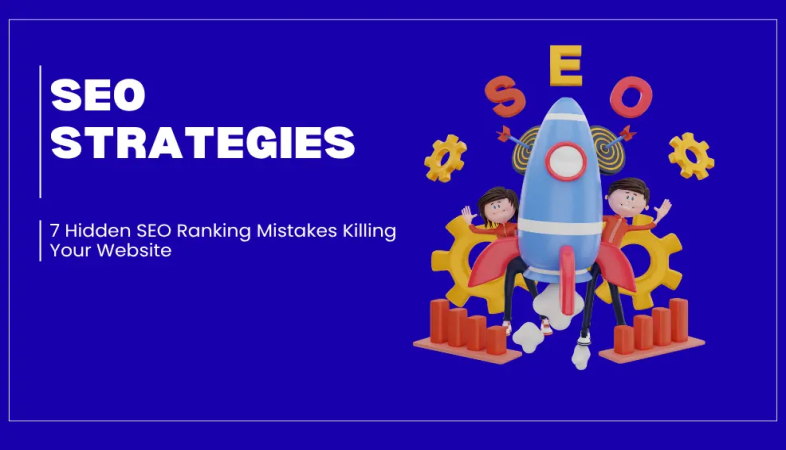
7 Hidden SEO Ranking Mistakes Killing Your Website

Key Takeaways
-
Mobile optimization is essential for both traditional SEO and AI/LLM visibility.
-
Local SEO, when supported with schema and consistent NAP, boosts geo-targeted search results.
-
AI tools prioritize semantic relevance and user intent over keyword repetition.
-
Thin and duplicate content will be ignored by both search engines and AI tools.
-
Website speed and performance directly affect rankings and AI inclusion.
-
On-page SEO elements like headings, metadata, and structured data are crucial for AI summarization.
-
Technical SEO—including structured markup, clean sitemaps, and crawlability—supports both Google indexing and AI parsing.
-
Backlinks from reputable sources increase authority across human and AI-powered search.
Are you investing time and money into SEO but still not getting the results you want? Whether you’re a small business in Texas or a growing enterprise, your website’s ranking could be suffering from invisible SEO mistakes that fly under the radar—especially in today’s AI-driven search environment.
Search isn’t just about traditional Google results anymore. With the rise of AI Overviews, voice search, and LLM-powered responses (like ChatGPT or Bard), your content needs to be optimized for both classic search engines and conversational AI tools.
At Ogrelogic, a leader in SEO services in Texas, we help businesses future-proof their websites by avoiding these critical SEO pitfalls. This guide uncovers the 7 most common mistakes that hurt rankings—and how to fix them for both Google and AI-powered search systems.
Ignoring Mobile Optimization (Still a Major Mistake in AI & Voice Search)
Mobile-first indexing remains crucial, but it now affects more than just Google rankings. Mobile optimization directly impacts how your site performs in AI overviews, which often rely on structured, mobile-friendly data.
Why It Hurts
-
AI systems prioritize user-friendly, fast-loading mobile experiences.
-
Voice assistants (like Siri or Google Assistant) reference mobile-optimized sites more often.
-
High bounce rates from slow mobile sites lower trust signals across platforms.
Quick Fix
Run your site through Google’s Mobile-Friendly Test and Core Web Vitals. Partner with a website design company in Texas like Ogrelogic to optimize layout, images, and speed for mobile.
Performance Table: Mobile Optimization Impact
| Website Type | Bounce Rate | Load Time (Mobile) | AI Overview Inclusion |
|---|---|---|---|
| Mobile-Optimized | 42% | 2.5 seconds | High |
| Not Mobile-Optimized | 73% | 6.8 seconds | Low |
AI Tip: Mobile pages with clean code and structured data have higher chances of being referenced in AI overviews.
Overlooking Local SEO (Especially in Geo-Aware AI Search)
Modern AI search tools like ChatGPT and Google SGE often include localized responses when users search with geographic intent.
Why It Hurts
-
AI tools and LLMs give preference to businesses with accurate, consistent local data.
-
An incomplete Google Business Profile reduces your chances of being included in AI-generated local listings.
Quick Fix
Optimize your GBP, use schema markup with your address, and include geo-modifiers in content like “SEO services in Texas” or “web developers near Austin.”
Top Local SEO Ranking Factors
| Factor | Human Search Impact | AI/LLM Search Impact |
|---|---|---|
| Google Business Profile | High | High |
| NAP Consistency | High | High |
| Local Backlinks | Medium | High |
| Local Schema Markup | Low | Critical |
AI Tip: Use structured data (LocalBusiness schema) so LLMs and AI tools can identify your relevance to local searches.
Keyword Stuffing or Misalignment with User Intent
AI search tools and language models don’t just match keywords—they look at semantic meaning and user intent. Old-school keyword stuffing no longer works.
Why It Hurts
-
Stuffed content reads poorly to both users and AI summarizers.
-
Misaligned intent confuses search engines and LLMs.
Quick Fix
Map your keywords to actual user questions. Use tools like AlsoAsked, AnswerThePublic, or Google's “People Also Ask” to structure your content around real search intents.
Keyword Use Example Table
| Keyword Strategy | Google Rank Impact | AI/LLM Inclusion |
|---|---|---|
| Keyword Stuffing | Negative | Low |
| Semantic Relevance | High | High |
| Long-Tail Phrasing | High | Very High |
AI Tip: Include full-sentence Q&A formats in your content (e.g., “What are SEO services in Texas?”) to increase chances of being quoted in AI search responses.
Publishing Thin or Duplicate Content (Fatal in AI Summarization)
AI search summaries pull from high-quality, original content that offers depth. Thin content is almost always excluded.
Why It Hurts
-
AI models ignore pages under 500 words unless extremely targeted.
-
Duplicate content gets filtered by both Google and LLMs.
Quick Fix
Invest in original, comprehensive content that answers user intent thoroughly. Use a mix of text, structured data, tables, and bullet points.
Content Depth Comparison
| Content Type | Google Ranking | AI Overview Appearance |
|---|---|---|
| Thin (<500 words) | Low | Very Low |
| Medium (800–1200) | Moderate | Medium |
| In-Depth (1500–2000+) | High | High |
AI Tip: Add FAQ sections and conversational language to improve LLM parsing and summarization accuracy.
Slow Website Speed (Affects AI Indexing & UX Rankings)
AI and traditional search engines both favor fast-loading, well-structured websites.
Why It Hurts
-
LLMs deprioritize slow sites when generating answers.
-
Core Web Vitals remain a major factor in both Google and Bing rankings.
Quick Fix
Use a CDN, optimize server response times, and compress large media files. Partner with a web development company in Texas like Ogrelogic for performance audits.
Core Web Vitals Benchmarks
| Metric | Ideal Value | Impact on SEO & AI |
|---|---|---|
| LCP | <2.5s | High |
| FID | <100ms | Medium |
| CLS | <0.1 | High |
AI Tip: Sites that load fast and display structured, scannable content are more likely to be indexed by AI crawlers.
Weak On-Page SEO (Overlooked by Humans and AI Alike)
On-page SEO still matters—and it now helps AI tools extract the right information to include in summarized answers.
Why It Hurts
-
Incomplete metadata leads to missed ranking and summarization opportunities.
-
Poor heading structure confuses both users and bots.
Quick Fix
Ensure every page has:
-
Keyword-rich H1, H2, and H3 tags
-
Meta descriptions that preview your value clearly
-
Image alt text and internal links
On-Page Optimization Essentials
| Element | Required for Google | Required for AI/LLM |
|---|---|---|
| Title Tags | Yes | Yes |
| Meta Descriptions | Yes | Yes |
| Structured Headings | Yes | Critical |
| Schema Markup | Optional | Highly Recommended |
AI Tip: Use bullet points, bolded subheadings, and data tables—AI tools love them for snippet-ready summaries.
Weak Technical SEO (Invisible to You, But Crucial to AI)
AI tools often rely on structured technical SEO to determine what your website is about. Without it, they skip over your content.
Why It Hurts
-
Broken links and site errors block indexing.
-
AI tools favor sites with clean code, XML sitemaps, and schema data.
Quick Fix
Use Google Search Console + Screaming Frog to scan for broken links, duplicate titles, slow redirects, and crawl issues.
Common Technical SEO Problems
| Issue | SEO Impact | AI/LLM Indexing Impact |
|---|---|---|
| Missing Sitemap | High | High |
| Broken Internal Links | Medium | High |
| Poor URL Structure | Medium | Medium |
| Lack of Schema | Medium | High |
AI Tip: Use JSON-LD structured data (FAQPage, LocalBusiness, Product) so AI tools can understand and feature your content accurately.
Bonus: No Link Building = No Authority in AI or Google
Backlinks build your site authority, which is a major signal for both human search and AI systems.
Why It Hurts
-
You won’t be seen as a source of truth by LLMs.
-
Your domain authority stays low, hurting ranking and snippet inclusion.
Quick Fix
Earn backlinks through local outreach, guest posts, digital PR, and by publishing high-value original content.
Link Types That Matter Most
| Link Type | SEO Value | AI Summary Impact |
|---|---|---|
| Editorial Links | Very High | High |
| Local Directories | Medium | Medium |
| Social Mentions | Low | Low |
| Niche Forums | Medium | Low |
AI Tip: Get mentioned by authoritative sites that LLMs train on (e.g., news outlets, industry blogs).
Future-Proof Your SEO for Google and AI
If your website isn't ranking as expected, you may be making one or more of these common mistakes. Fixing them won't just help you rank better in Google—it will also boost your visibility in AI overviews, LLM tools, voice search, and emerging platforms.
At Ogrelogic, our SEO experts specialize in helping Texas businesses stay ahead of the curve with a comprehensive approach tailored for search engines and AI alike.
Want to be found in Google AND AI tools like ChatGPT?
Need help creating structured, semantic content?
Ready to boost local SEO and drive real results?
Contact us today for a free SEO audit. Let Ogrelogic, the trusted name for SEO services in Texas, help you dominate across search platforms—human and AI.
Frequently Asked Questions (FAQs)
Q1: What is the biggest SEO mistake businesses in Texas make today?
A: The most common mistake is ignoring mobile and local SEO. Many Texas businesses haven’t optimized for mobile-first indexing or included location-specific content with schema markup, which hurts their visibility in local and AI-driven search results.
Q2: How does AI search affect my SEO strategy?
A: AI search tools like ChatGPT, Bard, and SGE analyze content semantically. They prefer structured, question-based content that directly answers user intent. Optimizing for AI means writing naturally, adding structured data, and including Q&A sections.
Q3: Will traditional keyword SEO still work in 2025?
A: Keywords still matter, but they must be used naturally and with intent. Search engines and AI tools now focus more on context and meaning rather than just exact match phrases.
Q4: How do I get my business featured in AI overviews or voice search results?
A: Create authoritative, well-structured content with FAQ sections, schema markup, and local business data. Focus on clear answers to specific questions, and keep your site fast and mobile-friendly.
Q5: How can Ogrelogic help improve my SEO?
A: Ogrelogic offers complete SEO services in Texas, including mobile optimization, local SEO, technical SEO audits, content creation, and structured data implementation—designed to help you rank on both Google and AI platforms.
Need Help? Let Ogrelogic help you fix these SEO mistakes and future-proof your website for Google and AI-driven search. Contact us today for a free audit!








